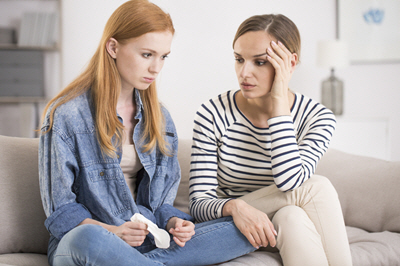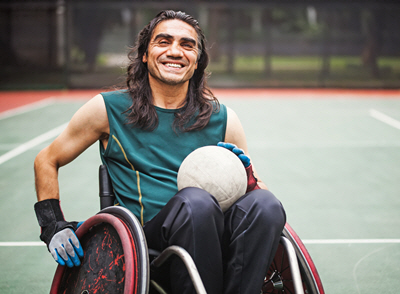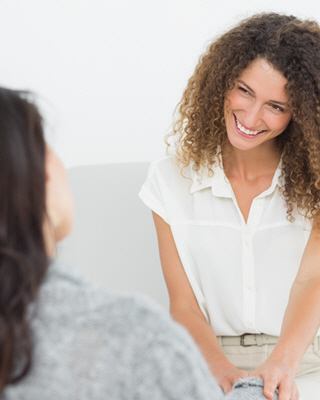More than listening
Some people will say, “Why pay someone to listen to you talk? That’s what friends are for.”
That makes perfect sense if your vision of therapy is a person with glasses and a notebook saying ‘Mmhmm’ while you vent. And that does take place in therapy sessions from time-to-time.
 And while friends may support you when you vent, most people are very uncomfortable with people expressing more serious feelings like sadness, fear, or insecurity.
And while friends may support you when you vent, most people are very uncomfortable with people expressing more serious feelings like sadness, fear, or insecurity.
You say, “My dog died.” And they say, “They’re in a better place.”
You say, “I’m scared I’ll get fired and won’t be able to support my family.” And they say, “You’re great at your job; you’re worrying too much!”
You say, “I hate the way I look.” And they say, “You’re beautiful!”
And they mean well! They want to comfort you, alleviate the pain you’re having, by putting a positive spin on it.
But sometimes we just need our pain acknowledged.
It’s normal to be sad if your dog died. Someone telling you they’re in a better place unconsciously communicates that you shouldn’t be sad or at least shouldn’t talk about being sad. Shouldn’t dwell on the pain because that’s uncomfortable, and so you should just not feel sad.
But that doesn’t actually help a person not feel sad. It just makes them feel like they should put a lid on it because other people aren’t okay with you feeling that way around them.
I base my therapy around honoring your feelings.
If you need to be sad, I will sit with you and acknowledge that your sadness matters. That your anger is allowed. That your insecurity isn’t something that can be laughed off. That it makes sense to be scared sometimes.
Parts of Therapy
 So what else is there to therapy if it’s not saying ‘mmhmm’?
So what else is there to therapy if it’s not saying ‘mmhmm’?
Learning skills
Most of us could use a good coping skill now and then, and they are not one-size-fits-all.
Some people benefit tremendously from body-based techniques like breathing exercises, yoga, regular exercise, or vigorous exercise when upset.
Other people respond well to thought-based practices like challenging negative thoughts, mentally walking through difficult situations, or imagining comforting scenarios.
Yet others do well with social-skill building and increasing their positive interactions time with others.
Using the skills
I work with you to find out what skills seem like they would benefit you most.
I help you practice them by doing the skill in session (like a breathing exercise), by role-playing the skill in a session (like how to handle conflict), or by building a plan for you to practice it during your week (like figuring out when you can attend a yoga class).
We will review if it ‘worked’ or has helped you. From there, we can either troubleshoot possible issues to improve the likelihood to it working next time. Or you can just let me know this doesn’t seem to be working for you, and we can figure something else out.
Healing what’s holding you back
People have baggage. And it can weigh you down, draining energy you’d like to spend on fun or more productive parts of your life.
It can cause you to act or react in ways that aren’t in your best interest – like pushing people away, avoiding things that would make your life better, or allowing bad situations or relationships to persist when you know it’s not good for you.
Nobody wants to be defined by these things that that have happened to us, yet you find it creeping into the most important and intimate parts of your life. You feel powerless to stop it.
I use EMDR therapy to help you process the things that are holding you back from living the life you want without feeling retraumatized or emotionally devastated afterwards.
A lot of people don’t even want to go there because they fear they’ll feel like they’ve been run over by an emotional steamroller if they confront these things.
 My number 1 priority when working on this tough stuff is keeping you emotionally safe.
My number 1 priority when working on this tough stuff is keeping you emotionally safe.
Before we even touch on the hard parts, I will teach you calming exercises and skills so that you learn how to get back to emotional safety in session when you need it – and in your everyday life.
I’ve done this kind of work myself. The comfort of knowing you can stop the terrifying and overwhelming feelings is monumental.
It’s like having an antidote to fear.
Fear that has been holding you back – holding your life back.
Together, at your pace, we will use EMDR techniques that neutralize your deepest, darkest, most difficult parts and build up feelings of safety.
I know it sounds too good to be true.
It isn’t.
I can help you get to the other side.
Practicing a healthy relationship
 Humans are innately social. It’s built into our DNA (literally) to build lives and societies interdependent with each other. In the broad US culture, we fiercely value independence, but the flip side of that is social isolation.
Humans are innately social. It’s built into our DNA (literally) to build lives and societies interdependent with each other. In the broad US culture, we fiercely value independence, but the flip side of that is social isolation.
This causes many of us to not know how to feel uncomfortable having healthy, emotionally intimate relationships. Many of us have relationships with our partners or family members, but there is often a level of insecurity, distance, or general disfunction involved because having intimate relationships is hard.
The corrective experience
If you find yourself in unsatisfying or dysfunctional relationships (friends, family, work relationships, community relationship, or romantic partners) over and over again, you likely need some help learning how to have a healthy emotionally intimate relationship.
If this is the case, having a healthy emotionally intimate relationship with your therapist can be a corrective experience.
You’ll be able to practice having an intimate relationship with a person who is emotionally stable and understands that you’ve got some baggage that might be influencing the way you have relationships with people.
 I promise to treat you with respect, to honor your feelings, and to set healthy boundaries to show you what a healthy relationship feels like. This sets you up to learn how it feels to be part of a safe dynamic. It is a core part of therapy.
I promise to treat you with respect, to honor your feelings, and to set healthy boundaries to show you what a healthy relationship feels like. This sets you up to learn how it feels to be part of a safe dynamic. It is a core part of therapy.
It’s normal for ‘stuff’ to come up on your end. Suspicion, distancing, vulnerability, anger, sadness. It’s part of reconciling the kind of relationships you’ve been having in your life and a healthy relationship. It’s like the relationships you’ve been having are a square peg, and healthy relationships are a round hole. There’re some growing pains.
I will be there for you every step of the way. Educating you, forming a genuine bond with you, processing feelings that arise
Our relationship can become a blueprint for the other relationships in your life.

